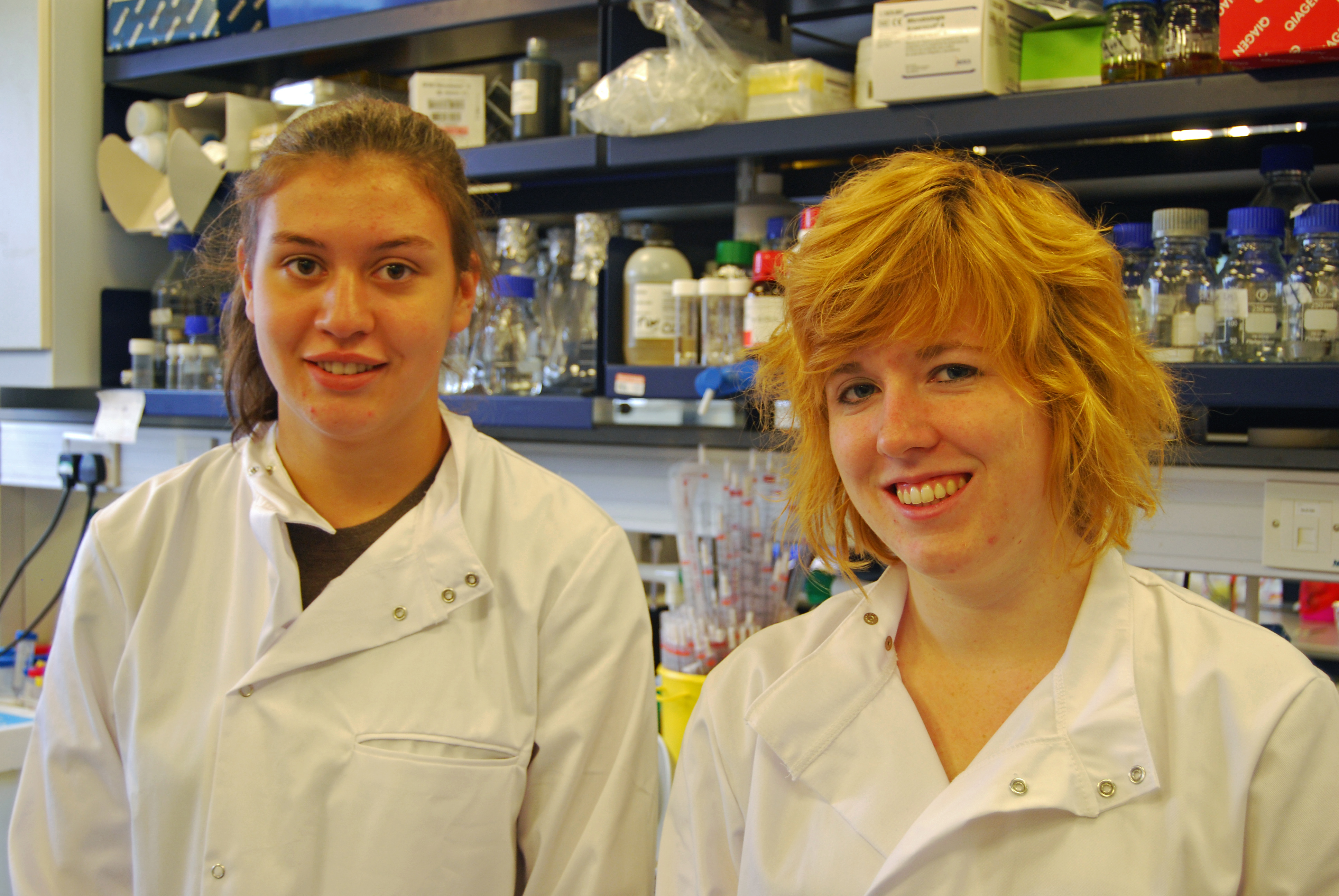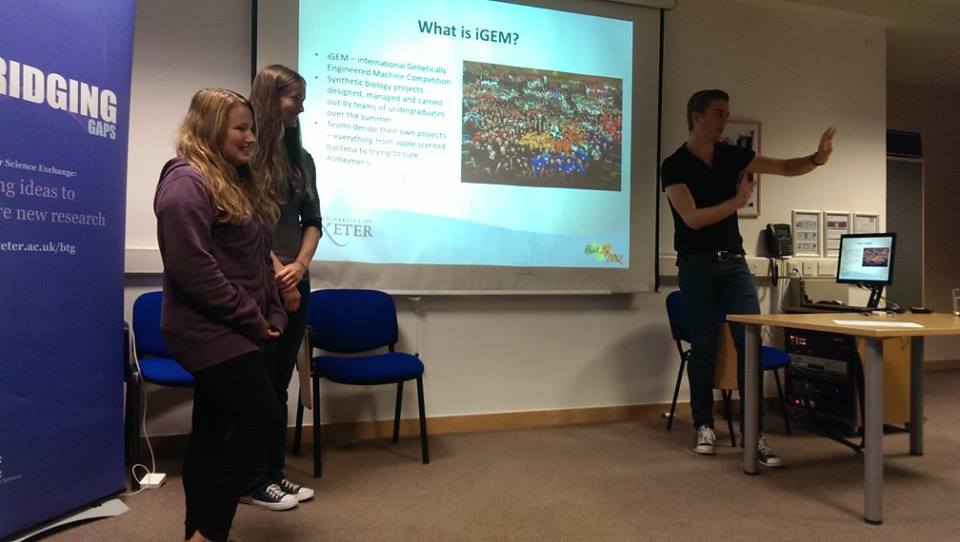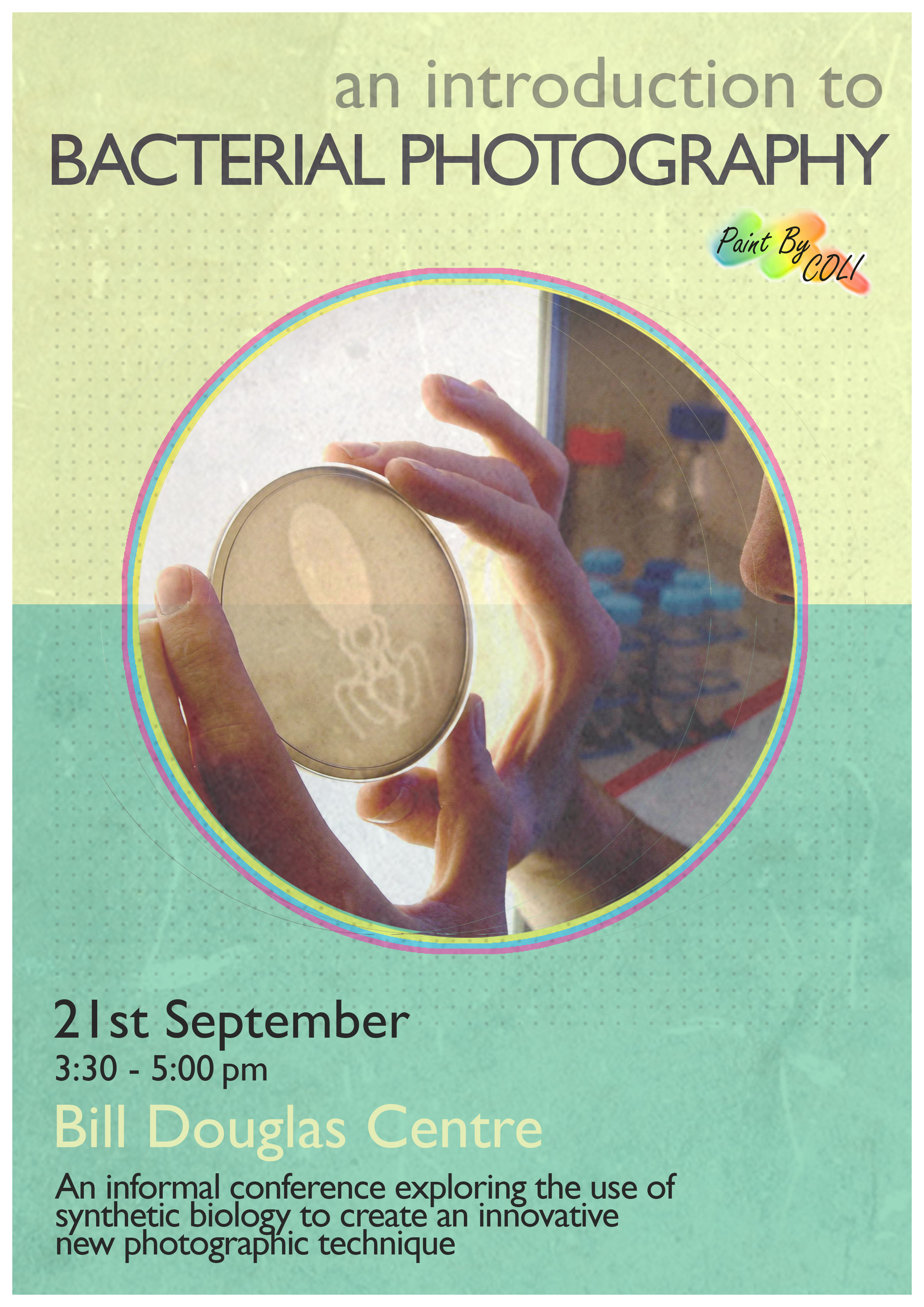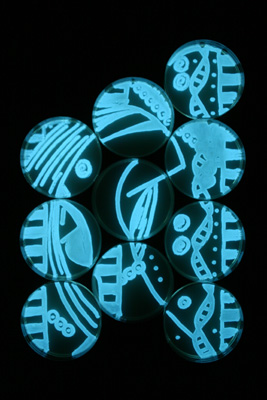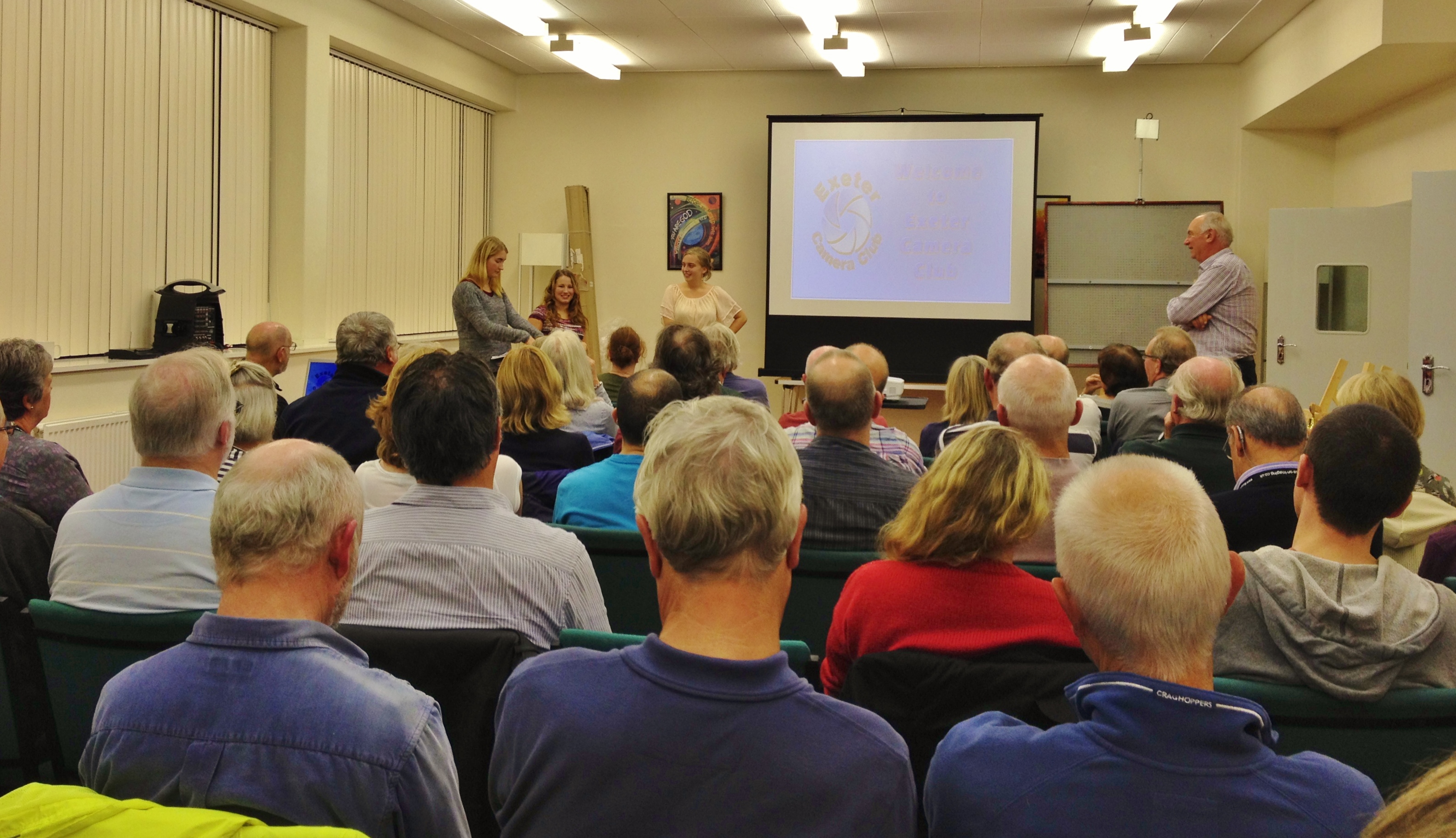Team:Exeter/Outreach
From 2013.igem.org
Outreach
Our ever helpful, extremely patient Sixth Form students
We have been lucky enough to be assisted by three sixth form students over this summer. Hector, Beccy and Gina spent a few weeks with us, learning about the University and the workings of a research lab. Beccy and Gina were given placements with the University of Exeter through the prestigious [http://www.nuffieldfoundation.org/nuffield-research-placements Nuffield Foundation], whereas Hector managed to organise working with us through his [http://www.exeterschool.org.uk/ college].
We showed them how our project is expected to work, the history behind the concepts within our project, and we worked together in the lab to learn new techniques using a variety of technology and equipment. All three managed to clock some good hours in the lab, learning how to make agar plates, gels, set up digestions and ligations and comforting the rest of us when things didn't quite go to plan. We were incredibly impressed with how hard they worked, the speed at which they picked up new techniques and ideas, and their excellent questions about the project and University life in general.
Although we were only able to work with three students in the way, this represents a fantastic outreach opportunity for our team. There is no better way to teach someone about iGEM than letting them have a go themselves, and although we supervised their work, all three of the students proved their understanding of the project and the impacts it could have on iGEM and the scientific community in general. Instead of simply presenting our project to them, they had a chance to explore the project for themselves and learn the details behind it.
Bridging the Gaps
We had the opportunity to present our project to a group of scientists in early September as part of the [http://www.exeter.ac.uk/btg/ EPSRC's Bridging the Gaps initiative]. Bridging the Gaps brings together scientists from a variety of disciplines to discuss their work, build partnerships, present findings and stimulate creative thinking. We presented our project alongside scientists discussing bio-art, designer bio-fuels, the use of neuroscience in social science and more. The feedback we received was largely positive, with some fantastic questions coming from the audience.
Our presentation included a summary of iGEM and its aims, background details to the [http://parts.igem.org/Coliroid coliroid] concept, an explanation of how our project pushes this subject further and our success so far. We hoped to give people an idea as to what iGEM is, and how it allows undergraduates to learn and improve their skills in a creative and practical competition setting. We also wanted to introduce the ideas behind our project, and showcase an area of science which they may not have been exposed to. Considering that the audience was not composed purely of scientists, we also wanted to make the presentation accessible to someone who may not have studied a science for several years.
From the feedback we received, which included comments from the audience, other guest speakers and the people who master-minded the talks, we feel like we achieved these aims and well-represented both the University of Exeter and iGEM.
Presentation to members of local Photography Societies
In late September, we organised and hosted an event for members of local Photography Societies to discuss the concept of BioArt, bacterial photography and give an introduction to our project.
The section on BioArt covered a whole variety of artists and pieces; from the beautiful, fluorescent images produced by Hunter Cole to the slightly more controversial work by "Stelarc". We wanted to highlight the importance of living organisms being used, but also the ethical issues that are raised by using a living organism in a piece of work.
This was followed by a concise explanation of how a bio-camera functions, and it's similarities to a long exposure, Victorian "box" cameras with silver nitrate film. We also stressed to the audience the variety of E. coli strains that exist and how the majority are harmless, including the one used in our own project. Comparisons were drawn between bacterial photography and digital photography and we proposed the question; has digital photography found itself a competitor in engineered E. coli? This led to a variety of questions and discussion from the audience.
We ended the presentation with an explanation of our project and the iGEM competition; as with the Bridging the Gaps talk, we were unsure of how scientifically "fluent" the audience would be, so we aimed to give an description that most people would be able to understand, and encouraged people to ask questions if they were unsure of any of the details.
We had a wealth of questions from the audience, ranging from "how long until we can buy a bacterial camera for ourselves?" to very practical questions, such as "how do you fix the image once the bacteria have developed the picture?". It was a fantastic opportunity to hear people's opinions and ideas on our project and the subject in general.
Talk to Students
We were given the opportunity to give a talk to a group of sixth form students with an interest in studying biology or a biology related subject at university.
We spoke about the iGEM competition, our iGEM project, studying biology, and university life. Our presentation included slides on why we decided to take part in iGEM, what aspects of the competition we enjoyed the most and what we felt we had gained from the experience. It was also an excellent chance to convince the students to think about taking part in iGEM if they are ever given the opportunity!
Intimate talk to Exeter Camera Club
On the evening of the 3rd of October, just hours before the wiki freeze, we were welcomed by Exeter Camera Club as guest speakers alongside other, more conventional, photographers. We began by introducing the audience to the field of synthetic biology, outlining how it differs from genetic modification and mentioning some of the exciting current work in the field. We went on to present a history of bacterial photography and talked about the pioneering work done by past iGEM teams, such as the University of Texas, Austin, before showcasing our own contributions to the makings of a biological camera and how it builds on, and differs from, previous work. The potential advantages of bacterial photography were discussed, concentrating on its possible ability to overcome the problems of noise that arise with very high resolution digital images. We also highlighted its potential for creating incredibly high resolution images that would far surpass the capabilities of standard digital sensors, possible due to the tiny size of bacteria. Members of the club were welcomed to ask us questions afterwards, which many of them did.
The enthusiasm we received for our work was astounding; many of the audience were interested in the iGEM competition and quizzed us more specifically on this, whilst many even asked us to keep them updated with any advances in our project. A wide variety of questions were posed to us, including several regarding the stability of any final images and the methods of image preservation, while one member asked if the E. coli's pigment production under darkness could have any applications for low light photography. These fuelled much discussion between the audience and ourselves, with both sides suggesting solutions, this gave us an insight into our own project but from a different angle and so was also a very useful and inspiring session for us also. Through this event we hoped to demonstrate the diverse and technological opportunities that are possible with synthetic biology and enthuse the audience on the exciting possibilities that this field of science offers. It also really allowed us to see how our work is received by the members of the photographic community, inform people about the iGEM community and build positive connections with local groups.
Planned "Post-Freeze" Talks
Unfortunately there are some events organised with third parties that could only be time-tabled in after the Wiki-freeze. Descriptions of the events are shown below, but we will not be able to upload any images or extra information about the events after they have occurred.
Presentation to the students reading Natural Science at Exeter
This year the University of Exeter has added a Natural Science degree to their programmes at the College of Life and Environmental Sciences. We have been invited to run seminars with the first years students on the course, giving introductions to synthetic biology, iGEM and the science behind our project. We will be working directly with fairly small groups of students; as they are reading a science degree, hopefully we'll be able to give them an insightful and detailed explanation of synthetic biology and our project whilst encouraging questions and feedback.
Invitation to speak to 2nd Year Undergraduates
Considering the fantastic opportunities offered by joining an iGEM team, and the fun we've had working together over the summer, we hope to transfer some of our enthusiasm to the students who will be able to apply to be a part of next year's Exeter iGEM Team. Several lecturers from both the [http://lifesciences.exeter.ac.uk/ College of Life and Environmental Sciences] and [http://emps.exeter.ac.uk/ College of Engineering, Mathematics and Physical Sciences] have asked us to speak to their second year undergraduates. This would be scheduled for after the iGEM competition has finished for this year, so that we can give an overall summary of the competition, our project and the experiences we've had over the summer.
This is only the second year that the University of Exeter has entered a team into iGEM; we hope that next year will build on the foundations that our team and the 2012 team have laid. Although this may not be classed as outreach, ensuring that iGEM continues within the University, and encouraging a new generation of Exeter students to take part in an event which has been such a highlight for all of us, will establish iGEM as a focal point of the University of Exeter community.
 "
"


